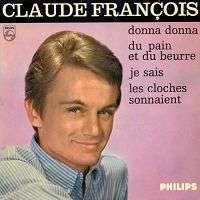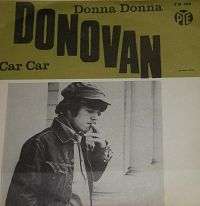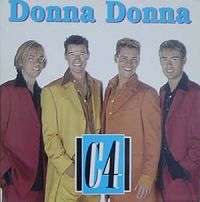Dona, Dona
"Dona Dona" popularly known as "Donna, Donna" is a song about a calf being led to slaughter written by Sholom Secunda and Aaron Zeitlin. Originally a Yiddish language song "Dana Dana" (in Yiddish דאַנאַ דאַנאַ), also known as "Dos Kelbl" (in Yiddish דאָס קעלבל meaning The Calf) it was a song used in a Yiddish play produced by Zeitlin.
| "Dana Dana (Yiddish original)" | |
|---|---|
| Song | |
| Language | Yiddish |
| Published | 1941 |
| Songwriter(s) | Sholom Secunda, Aaron Zeitlin |
| "Dona Dona (English version)" | |
|---|---|
| Song | |
| Language | English |
| Published | mid-1950s |
| Genre | Folk music |
| Songwriter(s) | Sholom Secunda, Aaron Zeitlin. English lyrics by Arthur Kevess and Teddi Schwartz |
History
"Dana Dana" was written for the Aaron Zeitlin stage production Esterke[1] (1940–41) with music composed by Sholom Secunda. The lyrics, score, parts, and associated material are available online in the Yiddish Theater Digital Archives.[2] The lyric sheet is in typewritten Yiddish[3] and handwritten Yiddish lyrics also appear in the piano score.[4] The text underlay in the score and parts is otherwise romanized in a phonetic transcription that appears oriented toward stage German.[5][6] The YIVO standardized transliteration system[7] was not then in widespread use, and many Yiddish transliterations looked like German, to which the Yiddish language is closely related.
The orchestra plays the "Dana Dana" melody at several points in Esterke. The original is 2/4, in G minor for a duo of a man and a woman, choral with the orchestral accompaniment. Secunda wrote "Dana-" for the orchestral score and "Dana Dana" for the vocal scores. The Yiddish text was written with Roman alphabet. He wrote for the choral score "andantino" (somewhat slowly) and "sempre staccato" (play staccato always). The melody of the introduction was also used at the end of the song. He wrote "piu mosso" (more rapidly) for the refrain and some passages that emphasize the winds. First, a woman (Secunda wrote "she") sings four bars and then the man (Secunda wrote "he") sings the next four. They sing together from the refrain. Although singing the third part of "Dana Dana" (="Dana Dana Dana Dana...") the man sometimes sings lower than the melody using disjunct motions. The melody is refrained. Then "he" sings the melody, and "she" sometimes sings "Dana", other times sings "Ah" with a high voice or technical passage. Secunda wrote "molto rit." (suddenly much more slowly) for the ending of the first verse. There are some differences between the original and the melody that are well known. Secunda wrote "ha ha ha" for the choral score with the broken chords.
There are various views as to the meaning of the Yiddish word Dana, repeated sixteen times in each chorus. Some believe it to be a nonesense word. A comment appearing in the Hebrew newspaper Haaretz (ref https://www.haaretz.co.il/misc/1.1256045), gives the meaning of Dana as the sound that was commonly made by the guide of a horse-drawn cart to encourage the horse to continue to step forward as it drags its heavy load. According to the comment in Haaretz, the translation of the word Dana (from Yiddish to Hebrew) was provided by Kol Israel in 1962, when the song was performed by Nechama Hendel. In the John Camden Hotten slang dictionary, the word Dana related to a nightman's or dustman's cart in old German / Austrian slang. https://www.gutenberg.org/files/42108/42108-h/42108-h.htm
Lyrics
| https://www.haaretz.co.il/misc/1.1256045
Yiddish original אױפֿן פֿורל ליגט דאָס קעלבל, כאָר: שרייַט דאָס קעלבל, זאָגט דער פּױער: כאָר בלינדע קעלבער טוט מען בינדן כאָר |
Translation by Shalom Secunda On a wagon bound and helpless Chorus: Now the calf is softly crying Chorus Calves are born and soon are slaughtered Chorus |
Translation by Kodesh & Schwartz On a wagon bound for market Chorus: “Stop complaining,” said the farmer, Chorus Calves are easily bound and slaughtered Chorus |
Literal English translation
Upon the wagon lies the calf, Chorus: The calf shouts; the farmer says, Chorus People tie up blind calves, Chorus |
Versions
| "Donna Donna" | |
|---|---|
| Single by Joan Baez | |
| from the album Joan Baez | |
| A-side | "House of the Rising Sun" |
| B-side | "Donna, Donna" |
| Released | 1960 |
| Recorded | 1960 |
| Genre | Folk music |
| Length | 3:15 or 3:09 |
| Label | Vanguard |
| Songwriter(s) | English lyrics by Arthur Kevess and Teddi Schwartz |
| "Donna Donna" | |
|---|---|
 | |
| Single by Claude François | |
| from the album Donna Donna / Les choses de la maison | |
| A-side | "Donna, Donna" |
| B-side | "Du Pain et du beurre / Je sais / Les cloches sonnaient" |
| Released | 1964-1965 |
| Recorded | 1964 |
| Genre | Folk music |
| Length | 2:32 |
| Label | Philips |
| Songwriter(s) | French lyrics by Vline Buggy, Claude François |
| "Donna Donna" | |
|---|---|
 | |
| Single by Donovan | |
| from the album What's Bin Did and What's Bin Hid | |
| A-side | "Donna, Donna" |
| B-side | "Car Car / (alternatively) Josie" |
| Released | 1965 |
| Recorded | 1965 |
| Genre | Folk music |
| Length | 2:56 |
| Songwriter(s) | Sholom Secunda, Aaron Zeitlin. English lyrics by Arthur Kevess and Teddi Schwartz |
| "Donna Donna" | |
|---|---|
 | |
| Single by C4 | |
| A-side | "Donna, Donna" |
| Released | 1998 |
| Recorded | 1998 |
| Genre | Dance music / disco |
| Length | 3:31 |
| Songwriter(s) | French lyrics by Vline Buggy, Claude François |
- Secunda's English version
Secunda translated "Dana Dana" into English language (changing the vocalization of 'dana' to 'dona'), but this version didn't gain much attention.
- Joan Baez version
The lyrics were translated once again in the mid-1950s, this time by Arthur Kevess and Teddi Schwartz, and the song became well known with their text.
It became especially popular after being recorded by Joan Baez in 1960 in her album Joan Baez. In her version, the song is retitled "Donna, Donna" (doubling the n"). This became very popular and later versions also used the double "n". The song became a staple of Baez and used in the human rights protest movement in the 1960s.
- Claude François version
In 1964, the song was recorded in French language by French singer Claude François as "Donna, Donna" reaching the top of the French Singles Charts for two consecutive weeks in December 1964. François co-wrote the French lyrics with Vline Buggy. The song also known by its longer title "Donna, Donna (Le Petit Garçon)" is a completely revamped version lyricwise, as it no longer describes a helpless calf being led to its slaughter, as in the original Yiddish version, but is rather about the troubles of an aspiring young boy growing up dreaming about his own future. In the last verse, in an autobiographical twist, Claude François alludes to himself by singing the verse as "ce petit garçon que j'étais" (this small boy that I was...).
- Donovan version
Very soon after the Claude François version, the Scottish singer-songwriter Donovan recorded another very popular cover of Baez' version in 1965. The track appeared on his album What's Bin Did and What's Bin Hid. The title is also "Donna, Donna", thus reinforcing further the popular "Donna" rather than the original transliteration "Dona".
- Hebrew version
"Dana Dana" has been translated from Yiddish into Hebrew as "Lama Dona" and interpreted by Rika Zaraï. Zaraï went on also to launch a French oriental dance version in her album Hava.
- Translations
The song was recorded in many other languages as well including German, French, Swedish, Japanese, Hebrew, Russian, Italian, Catalan and Vietnamese. In Vietnamese language, the lyrics was translated metaphorically from French version by Trần Tiến, a well-known musician in Vietnam. This version was performed by a girlband name Tam Ca Áo Trắng (Trio of schoolgirls). There is also a less popular Vietnamese version called "Tiếc thương" (Mourning) that expresses the mourning of a man whose lover died at the young age.
Covers
(Selective)
- Yiddish
The song has been recorded in original Yiddish lyrics amongst others by:
- Nechama Hendel (YouTube video)
- Chava Alberstein (YouTube video)
- Theodore Bikel (YouTube video)
- Sumi Jo (YouTube video)
- Karsten Troyke (YouTube video)
- Moni Ovadia (YouTube video).
The German folk ensemble Zupfgeigenhansel interpreted it as part of their 1978 album Jiddische Lieder ('ch Hob Gehert Sogn) (as "Dos Kelbl" (YouTube video) with lyrics from Jtschak Katsenelson).[8]
- English
The most famous recordings in the English language include those by Joan Baez and Donovan. But there are also versions by:
- American folk singers The Chad Mitchell Trio covered it on their 1961 US album Mighty Day on Campus
- English duo Chad & Jeremy (Chad Stuart and Jeremy Clyde) covered it on their January 1965 US album Sing For You on World Artists Records. It was a B-side to their single "If I Loved You" which reached number 23 on the Billboard Hot 100. It was also included on their 1966 US album More Chad & Jeremy on Capitol Records.
- Israeli folk duo Esther & Abi Ofarim recorded their version in 1966 in English for the album Noch Einen Tanz.[9]
- Actress and performer Patty Duke covered "Dona, Dona" on her unreleased 1968 album Patty Duke Sings Folk Songs - Time To Move On for United Artists Records. She also performed it at the time on The Ed Sullivan Show.
- Swedish band Ola & the Janglers covered it in English in as Side B of their single in 1966 (YouTube video)
- Mocedades, a Spanish-Basque singing group covered it in English in 1969
- Mary Hopkin covered it live during Expo '70 concert in Osaka, Japan
- In 1974, Filipino folk singer Wee Gee covered it in English naming her album Donna, Donna as well
- French
- The song was covered in French by Claude François (YouTube video). His version topped the French Singles Chart for 1964. Because of the popularity of his version, in 1965 he released his album Donna Donna / Les choses de la maison making "Donna, Donna" the title track.
- Dorothée and Hélène interpreted it in French as a duo on the inaugural edition of Rock'n'roll Show broadcast on prime time on TF1 in the autumn of 1993. (YouTube video)
- In 1998, the French boyband C4 released a French dance version as "Donna, Donna" (YouTube video) on Polygram having a minor hit on French Singles Charts reaching number 25 and staying 12 weeks on the chart.[10]
- Les Stentors a French 4-member super vocal group covered it in their self-titled 2010 debut album Les Stentors
- Others
- Catalan cover by Duo Ausona in 1965, "No T'emportis Mai L'Amor" (YouTube)
- Daniel Popović in Serbo-Croat in 1987 (album Slomljeno srce, Jugoton)
- Colombian band Los Speakers in Spanish (YouTube video)
References
- "Esterke". Jewishvirtuallibrary.org. Retrieved 2015-07-13.
- "Esterke". 2ndave.nyu.edu. 2005-05-13. Archived from the original on 2012-07-01. Retrieved 2015-07-13.
- "Photographic version of sheet music incorporating melody and lyrics - Part I". 2ndave.nyu.edu. Archived from the original (JPG) on 2012-03-05. Retrieved 2015-07-13.
- "Photographic version of sheet music incorporating melody and lyrics - Part II". 2ndave.nyu.edu. Archived from the original (JPG) on 2011-07-20. Retrieved 2015-07-13.
- "Photographic version of sheet music incorporating melody and lyrics - Part III". 2ndave.nyu.edu. Archived from the original (JPG) on 2012-03-05. Retrieved 2015-07-13.
- "Photographic version of sheet music incorporating melody and lyrics - Part IV". 2ndave.nyu.edu. Archived from the original (JPG) on 2012-03-05. Retrieved 2015-07-13.
- "Yiddish Transliteration and Spelling | YIVO transliteration chart for Yiddish alphabet | Yiddish Spelling Guidelines". Yiddishwit.com. Retrieved 2015-07-13.
- Zupfgeigenhansel – Jiddische Lieder ('ch Hob Gehert Sogn) (1979) album releases & credits at Discogs.com
- http://www.esther-ofarim.de/Disco.htm
- Lescharts.com: C4 - "Donna, Donna" song page